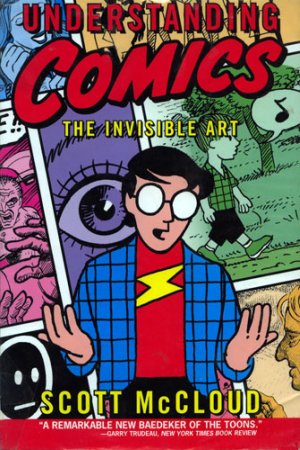 This essay was written in my first-year composition course at the George Washington University. University Writing Program faculty draw on a variety of disciplinary backgrounds (my Ph.D. is in American history, with current research on abolitionist visual rhetoric) to teach students to “enter the conversation” of academic research—to do detailed analysis and to engage existing scholarship rather than simply regurgitate it. This particular assignment arose out of the cross-fertilization that Craig Fischer argues is emblematic of comics scholarship, where academics, fans, practitioners, and popular critics seed each others’ ideas and produce more interesting work.
This essay was written in my first-year composition course at the George Washington University. University Writing Program faculty draw on a variety of disciplinary backgrounds (my Ph.D. is in American history, with current research on abolitionist visual rhetoric) to teach students to “enter the conversation” of academic research—to do detailed analysis and to engage existing scholarship rather than simply regurgitate it. This particular assignment arose out of the cross-fertilization that Craig Fischer argues is emblematic of comics scholarship, where academics, fans, practitioners, and popular critics seed each others’ ideas and produce more interesting work.
I had been teaching a “five-page paper” version of this exercise, where students analyze specific visual elements of a chosen comic or graphic novel in order to develop a claim in response to Scott McCloud’s Understanding Comics. This served as an introduction to comics (McCloud is great for that) but also to claim-making, because, as a foundational text, McCloud is the perfect foil: authoritative, comprehensive, and eminently fallible. Students always find interesting exceptions to his rules, new categories of panel transition or image/text interaction, and concrete ways to develop his vague generalizations. But the papers still felt academic in the pejorative sense: they represented a school genre that addressed only the professor as audience.
To move away from that, I consulted the Comix-Scholars Discussion List, fishing for ideas about formal criticism in the blogosphere: hence Noah. Noah was very interested in the project, helped me rethink the genre of comics criticism, and very kindly loaded me up with examples, many of which went onto the assigned reading list as a diverse set of models we read and discussed in class. Students now have a broader range of rhetorical choices to make regarding introductions, integration of images, organization, descriptive language, and analytical tone—not to mention examples of how to make a claim that might matter to someone outside the classroom.
As a final gesture, Noah asked me if he could publish some of the best examples students produced. I am most grateful for his generosity and I hope you enjoy the ones we’ve selected. The students are excited about sharing their work and, I trust, will be watching the comments closely. Please welcome them to the conversation.
_____
Phillip Troutman is Assistant Professor of Writing at The George Washington University, trout@gwu.edu

What a great read! I love that you put the actual assignment in there. And how refreshing to see (teaching/learning) academic writing and comics go hand in hand. Thanks for sharing!